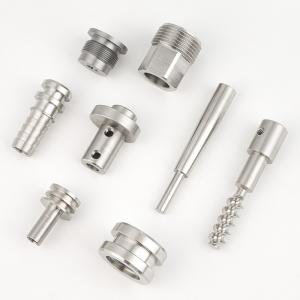

Add to Cart
OEM ODM Custom CNC Milling Turning Parts Stainless Steel Metal Parts Aluminum
CNC Machining Services
Advantages of CNC Machining
CNC milling and turning are highly precise and repeatable processes
that can achieve tight
tolerances ranging from +/-0.001″ to 0.005″, depending on specific requirements.
CNC machines can be programmed to operate reliably 24/7, making them ideal for on-demand
part production.
CNC machining services are especially valuable for creating custom CNC parts, whether it's for
replacing legacy components or delivering specialized upgrades to customers.
Additionally, CNC machining can efficiently scale from producing one-off parts to runs exceeding
10,000 units.
Turnaround times for CNC machined parts can be remarkably short, often as quick as one day,
and with shipping and delivery, deadlines can be met within a week.
Product Details
Another significant advantage of CNC technology lies in the mechanical properties it can achieve.
Unlike processes like injection molding or additive manufacturing, which may thermally transform
materials, CNC machining preserves all the desirable mechanical properties of the chosen metal or
plastic by removing material from the bulk.
CNC milling and turning can work with over 50 industrial-grade materials, including aluminum, brass,
bronze, titanium, stainless steel, PEEK, ABS, and zinc.
The primary requirement for CNC machining is that the material has sufficient hardness to be fixtured
and cut effectively.
Here is a comprehensive overview of the most popular materials.
| The Most Popular Materials | |
| Name | Characteristics |
| Aluminum 6061 | Good strength-to-weight ratio, excellent machinability, low hardness |
| Stainless Steel 304 | Excellent mechanical properties, resistant to corrosion & acid, relatively difficult to machine |
| Brass C360 | High ductility, excellent machinability, good corrosion resistance |
| ABS | Excellent impact resistance, good mechanical properties, susceptible to solvents |
| Nylon (PA6 & PA66) | Excellent mechanical properties, high toughness, poor moisture resistance |
| POM (Delrin) | High stiffness, excellent thermal & electrical properties, relatively brittle |
| Surface Finishes | ||
| Name | Applicable to | Machining marks |
| As machined | Metals, Plastics | Visible, light surface scratches |
| Smooth machining | ||
| Fine machining | Metals | Slightly visible |
| Polishing | Metals | Removed on primary surfaces |
| Bead blasting | Metals | Removed for non-cosmetic, removed on primary surfaces for cosmetic |
| Brushing | Metals | |
| Anodizing Type II | Aluminum | |
| Anodizing Type III | Aluminum | Visible under anodizing |
| Black oxide | Copper, Stainless steel, Alloy steel, Tool steel, Mild steel | Visible |
| Powder coating | Metals | Removed |
| Brushed + electropolishing | Stainless steel | Removed on Primary surfaces |
Specialist Industries
CNC machining offers a wide range of applications across various
industries.
Here are some examples:
1. Woodworking
2. Lettering and Engraving
3. Electrical Industry
4. Pharmaceutical Industry
5. Food and Beverage Industry
Company Profile
FAQ's
1. What is CNC Machining?
CNC machining is a subtractive manufacturing method employed to fabricate parts by cutting away
material from a workpiece or stock.
Precise instructions in the form of preprogrammed software and codes are input into the machine to
govern the movement of its tools and equipment.
CNC machining encompasses various machinery types, including turning mills, lathes, grinders, and
plasma-cutting machines.
2. 7 Key Advantages of CNC Machining
1. Minimal to Zero Material Waste: CNC machining stands out for its efficiency and the minimal
wastage it generates.
Thanks to its precision and accuracy, properly designed parts rarely result in faulty cuts, significantly
reducing the need to discard damaged components. CNC machines excel at precise cuts and angles,
minimizing material waste.
2. Exceptional Accuracy and Defect-Free Results: Precision is one of the primary benefits of CNC
machining. With precise computer instructions guiding the process, CNC machines consistently
produce identical, closely matching results.
This accuracy is especially valuable for creating parts with tight tolerances, virtually eliminating human
errors.
3. Rapid and Efficient Production: CNC machining offers remarkable speed and efficiency in production.
These machines can manufacture products at a much faster rate than traditional methods, and some
can even load and unload billets without human intervention.
This leads to substantial cost savings and increased productivity while ensuring consistent part quality.
4. Faster Assembly: Components produced through CNC machining are easier to assemble. Thanks to
the precision and consistency of CNC processes, companion parts fit together exactly as designed in the
computer model.
The quick machining process reduces waiting time for completed parts, streamlining the assembly
process with minimal need for extensive fitting and adjustment.
5. Enhanced Safety: CNC machining enhances safety in manufacturing by removing significant risks
from the shop floor. Automation eliminates many hazards associated with manual machining, and the
enclosed nature of CNC machines further reduces the risk of injury.
6. Reduced Energy Consumption: CNC machining is energy-efficient, using significantly less electricity
compared to older manufacturing processes.
According to the EPA, CNC machining consumes only about one-seventh of the energy used by
traditional methods.
The combination of speed and lower power consumption makes CNC machines environmentally friendly.
7. Lower Production Costs: CNC machining is cost-effective, efficient, and precise. It also utilizes fewer
raw materials compared to conventional machining.
Transitioning to CNC technology can lead to reduced errors, lower production expenses, and ultimately
lower product costs, making it an economically attractive choice for manufacturing parts and products.
